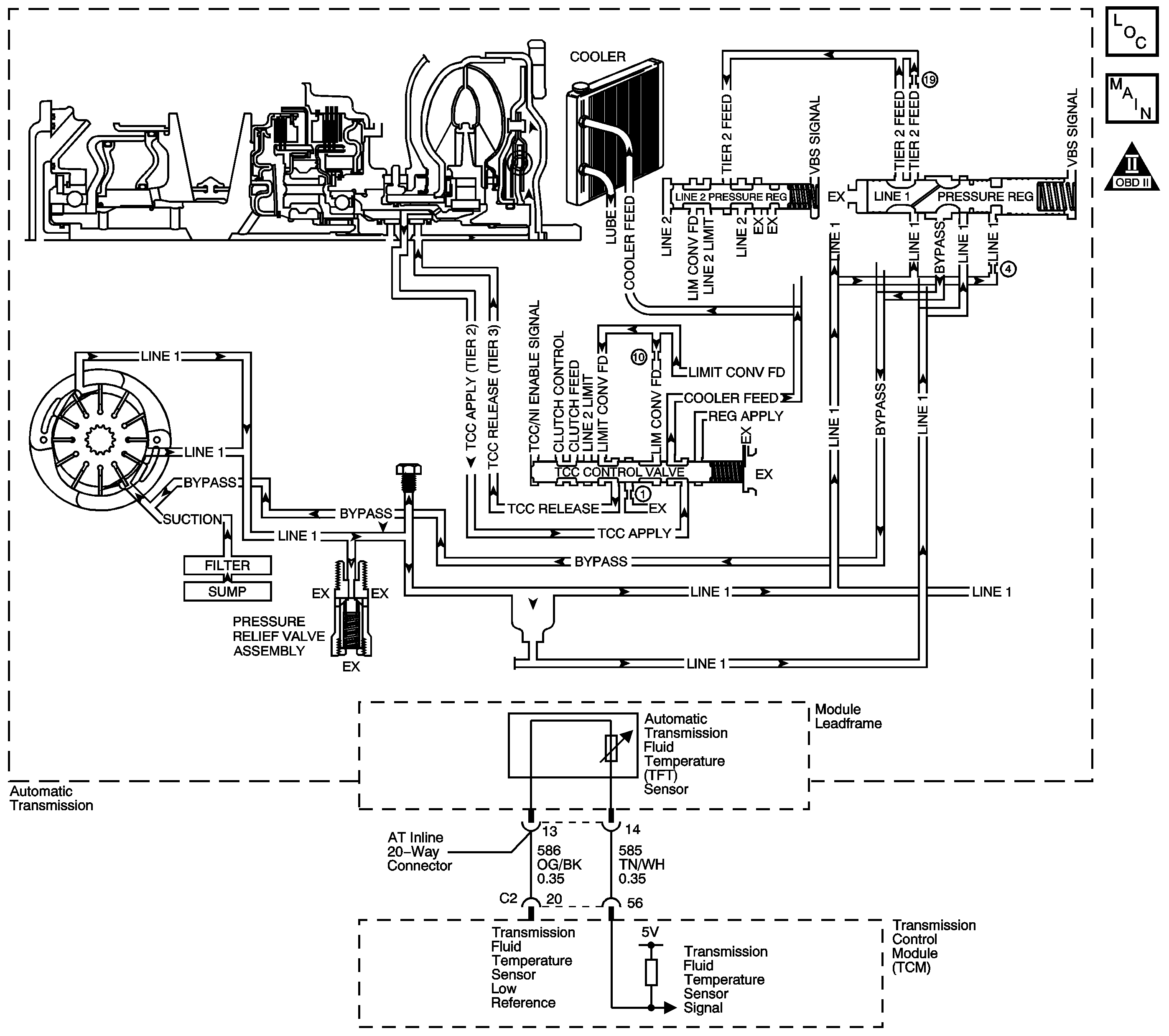
Circuit Description
The primary source of heat in the transmission is the torque converter. Hot oil exits the torque converter through the torque converter clutch (TCC) control valve and flows to the transmission cooler supply line. The supply line connects to the cooler, which is located in front of the radiator. From the cooler, the oil returns through the oil cooler return line and enters the lubrication circuits. After lubricating the internal components, the oil then returns to the oil pan. The oil pump draws oil through the filter. It pressurizes the oil and directs it to the line 1 pressure regulator valve and driven sheave. The line 1 pressure regulator valve is the starting point for the main supply of oil to the torque converter and the transmission hydraulic control systems.
If the TCM detects a high transmission fluid temperature for a long period of time, DTC P0218 sets. DTC P0218 is a type C DTC.
DTC Descriptor
This diagnostic procedure supports the following DTC:
DTC P0218 Transmission Condition Overtemperature
Conditions for Running the DTC
No TFT DTCs P0711, P0712 or P0713.
Conditions for Setting the DTC
The transmission fluid temperature is greater than 140°C (284°F) or more for 3 minutes.
Action Taken When the DTC Sets
| • | The TCM does not request the ECM to illuminate the malfunction indicator lamp (MIL). |
| • | The TCM will request the ECM to illuminate the service vehicle soon (SVS) lamp. |
| • | The TCM records the operating conditions when the Conditions for Setting the DTC are met. The TCM stores this information as Failure Records. |
| • | The TCM stores DTC P0218 in TCM history. |
Conditions for Clearing the SVS Lamp/DTC
| • | The TCM clears the SVS lamp request when the condition no longer exists. |
| • | A scan tool can clear the SVS lamp/DTC. |
| • | The TCM clears the DTC from TCM history if the vehicle completes 40 warm-up cycles without a non-emission related diagnostic fault occurring |
Diagnostic Aids
Ask the customer about overloading the vehicle, or exceeding the trailer towing limit.
Test Description
The numbers below refer to the step numbers on the diagnostic table.
-
This step tests for low fluid level, which can cause high transmission fluid temperatures.
-
This step inspects for transmission cooling restrictions.
Step | Action | Values | Yes | No | ||||||||
|---|---|---|---|---|---|---|---|---|---|---|---|---|
1 | Did you perform the Diagnostic System Check - Vehicle? | -- | Go to Step 2 | Go to Diagnostic System Check - Vehicle in Vehicle DTC Information | ||||||||
Important:
Did you perform the Transmission Fluid Checking Procedure? | -- | Go to Step 3 | Go to Transmission Fluid Check | |||||||||
Did you find and correct a condition? | -- | Go to Step 7 | Go to Step 4 | |||||||||
4 |
Did you find and correct a condition? | -- | Go to Step 7 | Go to Step 5 | ||||||||
5 | Did you perform the Line Pressure Check Procedure? | -- | Go to Step 6 | Refer to Line Pressure Check | ||||||||
6 | Inspect the torque converter for stator damage. Refer to Torque Converter Diagnosis . Did you find and correct the condition? | -- | Go to Step 7 | -- | ||||||||
7 | Perform the following procedure in order to verify the repair:
Has the test run and passed? | -- | Go to Step 8 | Go to Step 2 | ||||||||
8 | With the scan tool, observe the stored information, capture info and DTC info. Does the scan tool display any DTCs that you have not diagnosed? | -- | Go to Diagnostic Trouble Code (DTC) List - Vehicle in Vehicle DTC Information | System OK |
